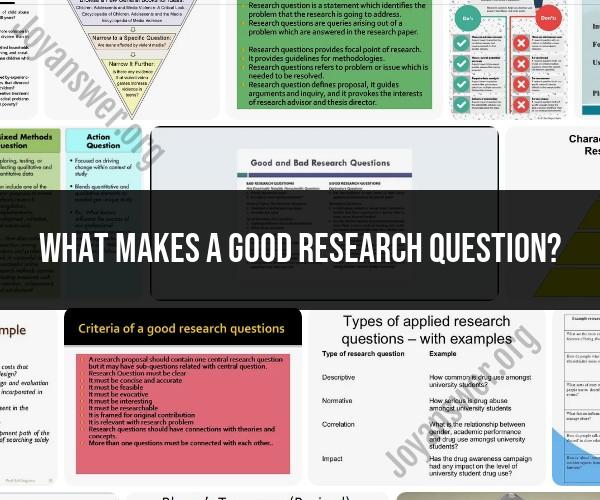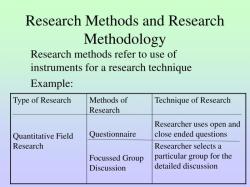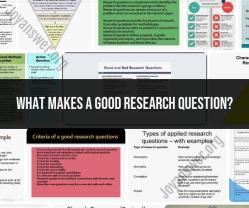What makes a good research question?
A good research question is a fundamental component of any quality research project. It serves as the foundation upon which your research is built and guides your investigation. Here are the essential characteristics of a good research question:
Relevance to the Field: Your research question should be relevant to your field of study. It should address a significant issue or gap in existing knowledge within your discipline.
Clarity and Specificity: The question should be clear, concise, and specific. Avoid vague or overly broad questions that are difficult to answer. Instead, focus on a well-defined topic or problem.
Feasibility: Ensure that your research question is feasible given the available resources, time, and data. It should be realistic to conduct research to answer the question within your constraints.
Measurable and Observable: Your research question should lead to measurable and observable outcomes. This allows for empirical investigation and data collection to provide evidence for your findings.
Originality: While it's not always necessary for a research question to be entirely novel, it should at least contribute something new to the existing body of knowledge. Avoid questions that have already been extensively explored unless you have a unique angle or approach.
Testability and Falsifiability: A good research question should be testable, meaning that it can be investigated empirically and potentially falsified through data and evidence. It should not be a question with a predetermined answer.
Significance: Consider the significance of the question in terms of its potential impact on your field or its practical relevance to real-world issues. Why is this question important? What are the implications of finding an answer?
Relevance to Your Goals: Align your research question with your research goals and objectives. Think about what you aim to achieve with your research and how the question fits into that framework.
Clear Research Design: Ensure that you have a clear idea of how you will conduct your research to answer the question. What methods, data sources, and analytical approaches will you use?
Interest and Motivation: Choose a research question that genuinely interests you and motivates your research. Passion for the topic can drive your commitment and enthusiasm throughout the research process.
Ethical Considerations: Consider the ethical implications of your research question. Ensure that your research respects ethical standards and guidelines, particularly when it involves human subjects or sensitive topics.
Scope: Define the scope of your research question appropriately. Avoid asking too many questions within a single research project. If your question is too broad, consider breaking it down into smaller, more manageable sub-questions.
Feedback and Peer Review: Seek feedback from peers, advisors, or mentors. Discussing your research question with others can help refine and improve it.
Long-Term Relevance: Think about whether your research question has long-term relevance. Will it still be meaningful and valuable in the future, or is it a transient issue?
Flexibility: Be open to revising or adapting your research question as you gather more information and data during your research journey. It's okay to refine your question as your understanding evolves.
Crafting a good research question is an iterative process that may involve multiple drafts and revisions. It's a critical step that sets the stage for the entire research endeavor, so take the time to carefully develop a question that meets these essential criteria.
Crafting Effective Research Questions: A How-To Guide
A well-crafted research question is essential for any successful research project. It is the question that will drive your inquiry and guide you in your data collection and analysis. A good research question is clear, focused, and feasible. It is also important to make sure that your research question is original and contributes to the existing body of knowledge in your field.
Here is a step-by-step guide to crafting effective research questions:
- Identify your general topic area. What are you interested in researching? What are the major issues or debates in your field?
- Narrow down your focus. Once you have a general topic area, start to narrow down your focus. What specific aspect of the topic are you most interested in? What question do you want to answer?
- Do a preliminary literature review. This will help you to learn more about your topic and identify any gaps in the existing research.
- Formulate your research question. Once you have a good understanding of your topic, you can start to formulate your research question. Make sure that your question is clear, focused, and feasible.
- Refine your question. Once you have a draft of your research question, take some time to refine it. Make sure that it is specific and measurable, and that it contributes to the existing body of knowledge in your field.
Here are some examples of good research questions:
- What is the impact of social media on the mental health of adolescents?
- What factors contribute to the academic achievement of students from low-income families?
- What is the most effective way to reduce greenhouse gas emissions?
The Key Elements of a Well-Formulated Research Question
A well-formulated research question should have the following key elements:
- Clarity: The question should be clear and concise. It should be easy to understand and should not be ambiguous.
- Focus: The question should be focused on a specific aspect of a topic. It should not be too broad or too narrow.
- Feasibility: The question should be feasible to answer within the given resources and time constraints.
- Originality: The question should be original and contribute to the existing body of knowledge in the field.
From Inquiry to Research Question: Strategies for Success
The first step in crafting an effective research question is to develop a clear inquiry. What are you curious about? What do you want to learn more about? Once you have a clear inquiry, you can start to brainstorm specific research questions.
Here are some strategies for developing effective research questions:
- Ask yourself "why?" and "how?": Why is this topic important? Why is it worth studying? How can we learn more about it?
- Look for gaps in the literature: What areas of your topic have been understudied? What questions have not yet been answered?
- Talk to experts in your field: What research questions are they interested in? What do they think are the most important issues to address?
- Consider your audience: Who are you writing for? What do they need to know?
Once you have brainstormed a list of research questions, take some time to evaluate them. Choose a question that is clear, focused, feasible, and original.
Here is an example of how to move from inquiry to research question:
- Inquiry: I am curious about the impact of social media on the mental health of adolescents.
- Research question: What is the impact of social media use on the mental health of adolescents aged 13-17?
This research question is clear, focused, feasible, and original. It is also specific enough to be answered within a research paper.
Crafting effective research questions is an important skill for any researcher. By following the tips above, you can develop research questions that will lead to meaningful and insightful findings.



